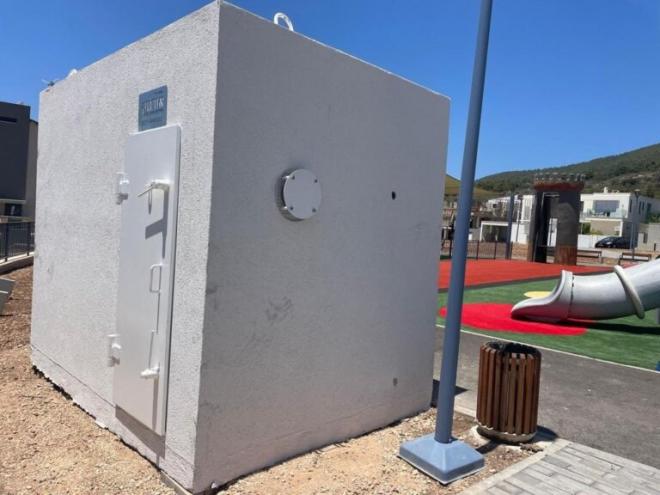以色列北部處於邊緣,需要庇護所Israel’s North on Edge and in Need of Shelters
Published by admin on Thu, 08/10/2023 - 12:37
Israel’s North on Edge and in Need of Shelters
Published on: 7.8.2023
By: David Parsons, ICEJ Vice President & Senior Spokesman
Israel’s sharp divide over judicial reforms has Iran and its regional proxy militias thinking the Jewish state is weak and exposed. This has led Hizbullah to stage a recent series of open provocations along the Lebanon border that were met with tepid responses by Jerusalem. While no one is seeking a major war right now, even the smallest misstep could easily trigger an escalation, prompting officials in northern Israel to rush to provide more bomb shelters for their vulnerable communities.
Israel’s sworn enemies have watched over recent months as thousands of IDF reservists protested the government’s proposed judicial reforms by refusing to serve their annual reserve duty. The protests could impact the Israeli army’s preparedness for a major conflict with Iran. In response, Iranian and Hizbullah leaders have openly taunted Israel as a nation on its way down.
This is a serious misread of Israel’s military strength and national resolve. Nonetheless, Hizbullah has felt emboldened to test Israel’s readiness for a fight by conducting provocative actions in plain sight along the UN-demarcated ‘Blue Line’ between Israel and Lebanon.
First, Hizbullah set up tents on Israel’s side of the border but north of its security fence. A group of armed Hizbullah militiamen in combat uniform also marched right along the border fence. In addition, Hizbullah operatives climbed a tower on the border fence and carted off Israeli surveillance equipment. Finally, the radical Shi’ite militia fired a tank shell into an open area in the disputed Mount Dov sector.
These actions mark a shift by Iran and Hizbullah in their “shadow war” with Israel. Until now, they mainly carried out covert operations along the border, such as digging terror tunnels under the security fence. In contrast, they are now openly baiting Israel to retaliate, leaving northern Israel on edge.
The IDF did send a strong signal that it is battle-ready by staging a major military exercise in the North which even simulated a large ground incursion deep into Lebanon to neutralise Hizbullah.
Meanwhile, towns and villages in northern Israel are rushing to bolster their civilian defenses by upgrading and adding bomb shelters. Recent studies show the North sorely lacks adequate shelters for its growing population, especially given Hizbullah’s arsenal of over 200,000 rockets and missiles.
The International Christian Embassy Jerusalem became aware of this need several years ago and has been working to supply portable bomb shelters to these vulnerable areas. Over the past decade, the ICEJ has donated nearly 200 mobile bomb shelters to vulnerable Israeli communities, with most going to towns along the Gaza border facing frequent Hamas rocket attacks, but we have managed to place some 50 shelters in northern Israel already.
Thanks to the generosity of a Swiss Christian family, we are currently delivering six new bomb shelters to the town of Shlomi, which was struck by a rocket fired from southern Lebanon on the first day of Passover. The rocket landed in a busy intersection – with a bank, a synagogue, a store and a law firm on each corner.
A town of 9,000 residents which borders Lebanon, Shlomi has suffered its share of rocket attacks over recent decades. But city officials say the town is not prepared for what is likely to come in a future war with Hizbullah. Rocket alarms in Shlomi often give only 2-to-3 seconds of warning of incoming short-range mortars. Half the residents still live in the “old city” of Shlomi, which has no shelters. The government has promised hundreds of millions of shekels for shelters in the North, but very little has come so far.
The ICEJ’s newest shelters are being placed in public areas to serve the whole community, such as playgrounds, synagogues and at bus stops.
In addition, ICEJ-USA is providing funds to refurbish 53 existing underground shelters in Shlomi. The work will involve sealing water leaks, fixing faulty electrical networks, installing new lighting, water pumps, drainage systems, and fans for improved ventilation, applying fresh coats of paint, and much more.
以色列北部處於邊緣,需要庇護所
發佈於:2023 年 8 月 7 日
作者:大衛柏森斯,ICEJ 副總裁兼高級發言人
以色列在司法改革問題上的嚴重分歧讓伊朗及其地區傀儡民兵認為這個猶太國家軟弱且暴露弱點。 這導致真主黨最近在黎巴嫩邊境發動了一系列公開挑釁,但耶路撒冷方面反應不溫不火。雖然目前沒有人尋求一場大規模戰爭,但即使是最小的失誤也很容易引發升級,促使以色列北部的官員急於為其脆弱社區提供更多防空洞。
近幾個月來,以色列的死敵一直關注著數千名以色列國防軍預備役軍人拒絕履行年度預備役義務,以抗議政府擬議的司法改革。 抗議活動可能會影響以色列軍隊對與伊朗發生重大衝突的準備。 作為回應,伊朗和真主黨領導人公開嘲笑以色列這個正在走下坡路的國家。
這是對以色列軍事實力和民族決心的嚴重誤讀。 儘管如此,真主黨卻有勇氣沿著聯合國劃定的以色列和黎巴嫩之間的「藍線」進行挑釁行動,以測試以色列的戰鬥準備情況。
首先,真主黨在以色列邊境一側、安全圍欄以北搭建了帳篷。一群身著戰鬥服的真主黨武裝民兵也沿著邊境圍欄行進。此外,真主黨特工爬上邊境圍欄上的一座塔樓,運走以色列監視設備。最後,激進的什葉派民兵向有爭議的多夫山地區的開闊地區發射了一枚坦克砲彈。
這些行動標誌著伊朗和真主黨在與以色列的「影子戰爭「中的轉變。到目前為止,他們主要在邊境地區進行秘密行動,例如在安全圍欄下挖掘恐怖隧道。相比之下,他們現在公開引誘以色列進行報復,讓以色列北部感到緊張。
以色列國防軍確實發出了強烈的信號,表明它已做好戰鬥準備,在北部舉行了一次大型軍事演習,甚至模擬了深入黎巴嫩的大規模地面入侵以壓制真主黨。
與此同時,以色列北部的城鎮和村莊正急於通過升級和增建防空洞來加強民防。 最近的研究表明,以色列北部嚴重缺乏足夠的庇護所來容納不斷增長的人口,特別是考慮到真主黨擁有超過 20 萬枚火箭和導彈。
耶路撒冷國際基督教大使館幾年前就意識到了這一需求,並一直致力於為這些脆弱地區提供便攜式防空洞。 在過去的十年中,ICEJ 已向脆弱的以色列社區捐贈了近200 個移動防空洞,其中大多數前往加沙邊境沿線面臨頻繁哈馬斯火箭襲擊的城鎮,但我們已經成功在以色列北部安置了約50個避難所。
感謝一個瑞士基督徒家庭的慷慨解囊,我們目前正在向什洛米鎮提供六個新的防空洞,該鎮在逾越節的第一天被黎巴嫩南部發射的火箭襲擊。 火箭降落在一個繁忙的十字路口——每個角落都有一家銀行、一座猶太會堂、一家商店和一家律師事務所。
什洛米是一個與黎巴嫩接壤、擁有 9,000 名居民的小鎮,近幾十年來一直遭受火箭彈襲擊。 但市政府官員表示,該鎮還沒有為未來與真主黨的戰爭做好準備。 什洛米的火箭警報通常只對短程迫擊砲來襲發出 2 到 3 秒的警告。 一半居民仍居住在什洛米「老城」,那裡沒有避難所。 政府承諾為北方的避難所提供數億謝克爾的資金,但迄今為止收效甚微。
ICEJ最新的庇護所被安置在公共區域,為整個社區提供服務,例如遊樂場、猶太教堂和公交車站。
此外,ICEJ美國分會還提供資金翻新Shlomi現有的53個地下避難所。 這項工作將包括密封漏水、修復有故障的電網、安裝新的照明、水泵、排水系統和風扇以改善通風、塗上新的油漆等等。
